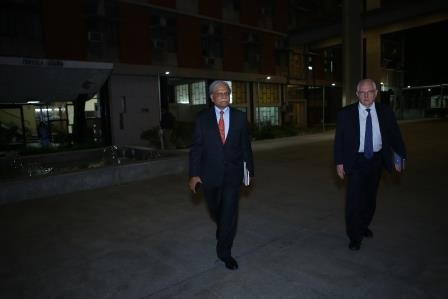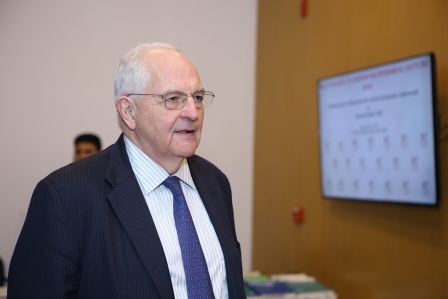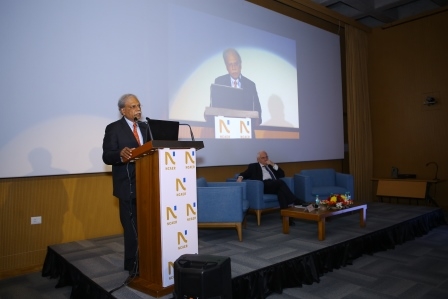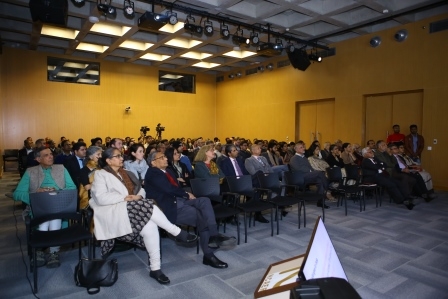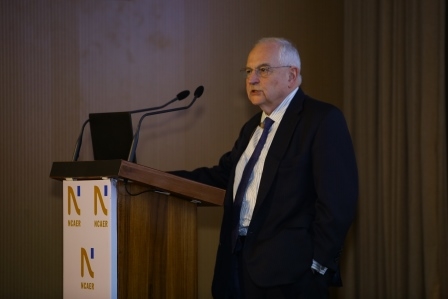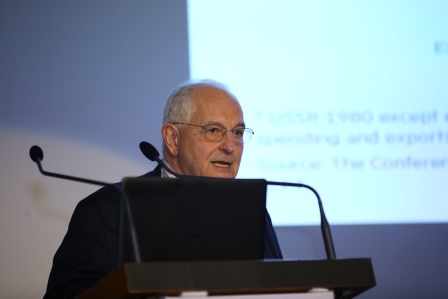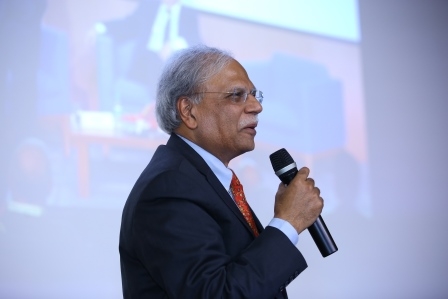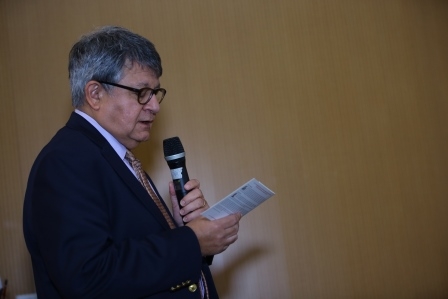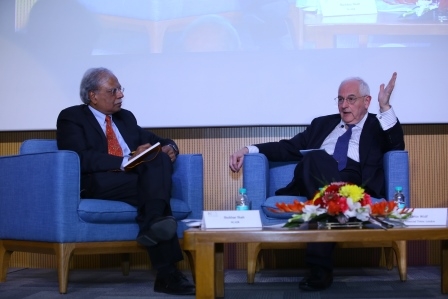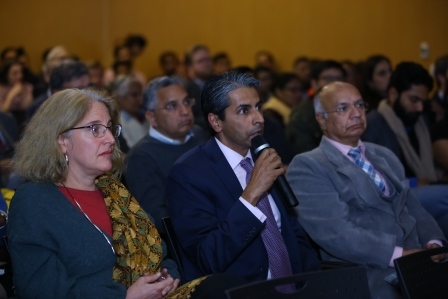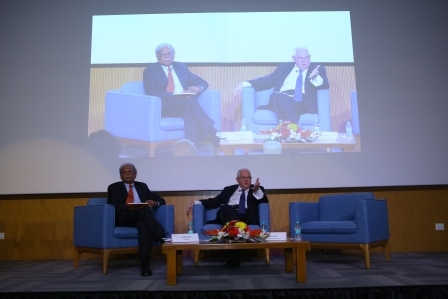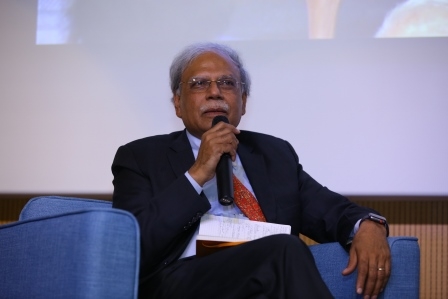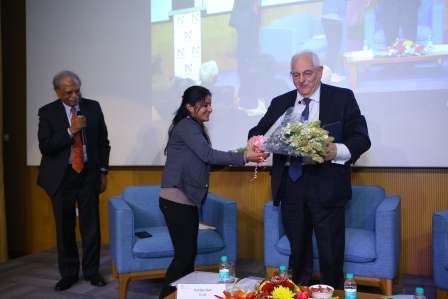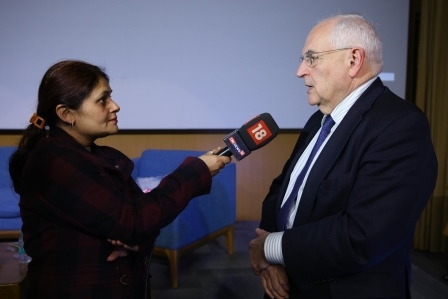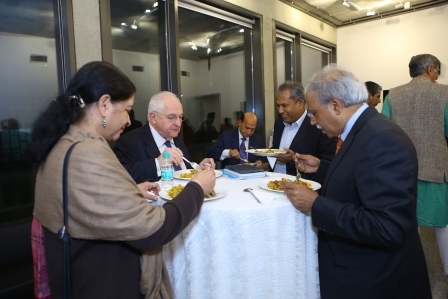Challenges to India from Global Economic Upheavals
by
Mr Martin Wolf, CBE
Associate Editor and Chief Economics Commentator,
Financial Times, London
Mr Martin Wolf, Associate Editor and Chief Economics Commentator at the Financial Times, London, and among the world’s most influential financial journalists, delivered NCAER’s 7th C D Deshmukh Memorial Lecture at the NCAER India Centre, New Delhi, on January 15, 2019.
Held in NCAER’s new, world-class, T2 Conference Centre, the lecture was attended by a distinguished audience including economists, civil servants, prominent media persons, industry analysts, and students. The Honourable Union Finance Minister,
Shri Arun Jaitley, was expected to be the Guest of Honour, but could not join and sent his best wishes.
In his 2019 Deshmukh lecture, Mr Wolf argues that the world is experiencing economic, political, and technological upheavals. His lecture addresses five such upheavals: the rapid economic rise of Asia, of which India is an important part; the emergence of a possible enduring strategic rivalry between the US and China; the rise in US protectionism and the associated erosion of the liberal global economic order; the potentially dramatic consequences of revolutionary developments in artificial intelligence and machine learning; and the threat of climate change. India will be deeply affected by all these changes, and will need to play an important role in their management.
Martin Wolf said, “We are in transition between an old world we thought we understood and a new one we can barely imagine. Such times of transition have in the past proved hazardous: think of the period before the First World War or the interwar years. This one seems unlikely to be an exception to that rule. These dramatic changes have to be managed by countries, individually, and by the world, collectively…This Lecture is not only about India in a world in upheaval, but also about the possible effects of India upon a world in upheaval.” The full text of his lecture is reproduced below.
In the second part of his lecture, Wolf looks at what these changes might mean for India. He asks the question, how, in particular, might India secure the stable and supportive global environment it will need for sustained development? How, furthermore, should it shape its domestic policies in this environment? Wolf’s NCAER-Deshmukh Lecture provides some answers and also clarifies the questions. An audio recording of the Lecture is available here.
Dr Shekhar Shah, Director-General of NCAER, in his introduction, said “Martin Wolf is an institution unto himself. He is widely regarded as one of the world’s most influential economic journalists: indeed, I actually think he is the world’s most influential economic journalist.”
Shah continued, “Though Martin is closely connected to almost every influential policymaker globally, he is deeply trusted for his independence and pragmatism, refreshingly free of slavery to any one ideology. Martin has a deep faith in markets and international trade, based on his years of work at the World Bank and elsewhere, but he is also a strong supporter of Keynesian ideas that he was taught at Oxford, and of public goods as the building blocks of civilisation. He has been called ‘arguably the most widely trusted pundit’ of the global financial crisis of 2007-10, when he used the influential global platform of the Financial Times to advocate a massive fiscal and monetary response to the crisis, an advice that was widely followed.”
In concluding his lecture, Martin Wolf said, “India needs to think hard about how best to respond to the rapidly changing global environment… As a rising power, which is virtually certain to have the world’s third largest economy within a decade, it needs to decide how to influence this emerging world for the better. It can do so by strengthening alliances with similarly minded countries and promoting global trade liberalisation.
At the same time, it needs to shape its domestic policies in the light of this changing global environment. It is time for India to consider what sort of global power it wishes to be. Will it try to uphold a liberal global order in which all countries co-operate, or will it stand aside from such challenges? The choices India makes will not only matter for this country, but also for the world. What sort of country does India want to be and in what sort of world? We all wait to find out.”
About Martin Wolf
Martin Wolf was awarded the CBE, the Commander of the Order of the British Empire, in 2000 “for services to financial journalism.” He was a member of the UK government’s Independent Commission on Banking during 2010-11. He is a member of the International Media Council of the World Economic Forum.
After graduating from Oxford with an MPhil, he joined the World Bank in 1971 and worked as an economist on India during 1974 to 1977, developing deep bonds with the country and many of its most prominent economists and policymakers. He subsequently worked at the London-based Trade Policy Research Centre as the Director of Studies before moving to the Financial Times in 1987.
Mr Wolf was made a Doctor of Science (Econ), honoris causa, by the London School of Economics in 2006 and a Doctor of Science, honoris causa, by Warwick University, in 2009. He is an honorary fellow of Nuffield College, Oxford University.
Mr Wolf was joint winner of the Wincott Foundation senior prize for excellence in financial journalism for 1989 and 1997. He won the “Accenture Decade of Excellence” at the Business Journalist of the Year Awards of 2003. He won the “Commentator of the Year” award at the Business Journalist of the Year Awards of 2008. He won the Ludwig Erhard Prize for economic commentary for 2009. He won “Commentariat of the Year 2009” at the Comment Awards, sponsored by Editorial Intelligence. He was placed in Foreign Policy’s list of the “Top 100 Global Thinkers” in 2009, 2010, and 2011. He was joint winner of the 2009 award for columns in “giant newspapers” at the 15th annual Best in Business Journalism competition of The Society of American Business Editors and Writers. He won the Overseas Press Club of America’s prize for “best commentary on international news in any medium” for 2013.
His most recent publications are Why Globalization Works (Yale, 2004), Fixing Global Finance (Johns Hopkins, 2008 and Yale, 2010), and The Shifts and the Shocks: What we’ve learned–and have still to learn–from the financial crisis (Allen Lane, 2014). China Business News named Fixing Global Finance its “Financial Book of the Year” for 2009. Mr Wolf was educated at Oxford University.
About C D Deshmukh
Sir Chintaman Dwarakanath Deshmukh was the first Indian to be appointed Governor of the Reserve Bank of India in 1943, was part of the official Indian delegation to the 1944 Bretton Woods Conference that led to the creation of the World Bank and the International Monetary Fund, and served as Governor, RBI, until 1949. He served as the Union Finance Minister during 1950 to 1956 under Prime Minister Nehru, and was a founding member of NCAER’s first Governing Body in 1956. He later served as Chairman of the University Grants Commission and as the Vice-Chancellor of Delhi University, during which time he also founded the India International Centre. He was honoured by the President of India with the Padma Vibhushan in 1975. NCAER is privileged to honour the memory of C. D. Deshmukh as part of its more than 60-year legacy.






